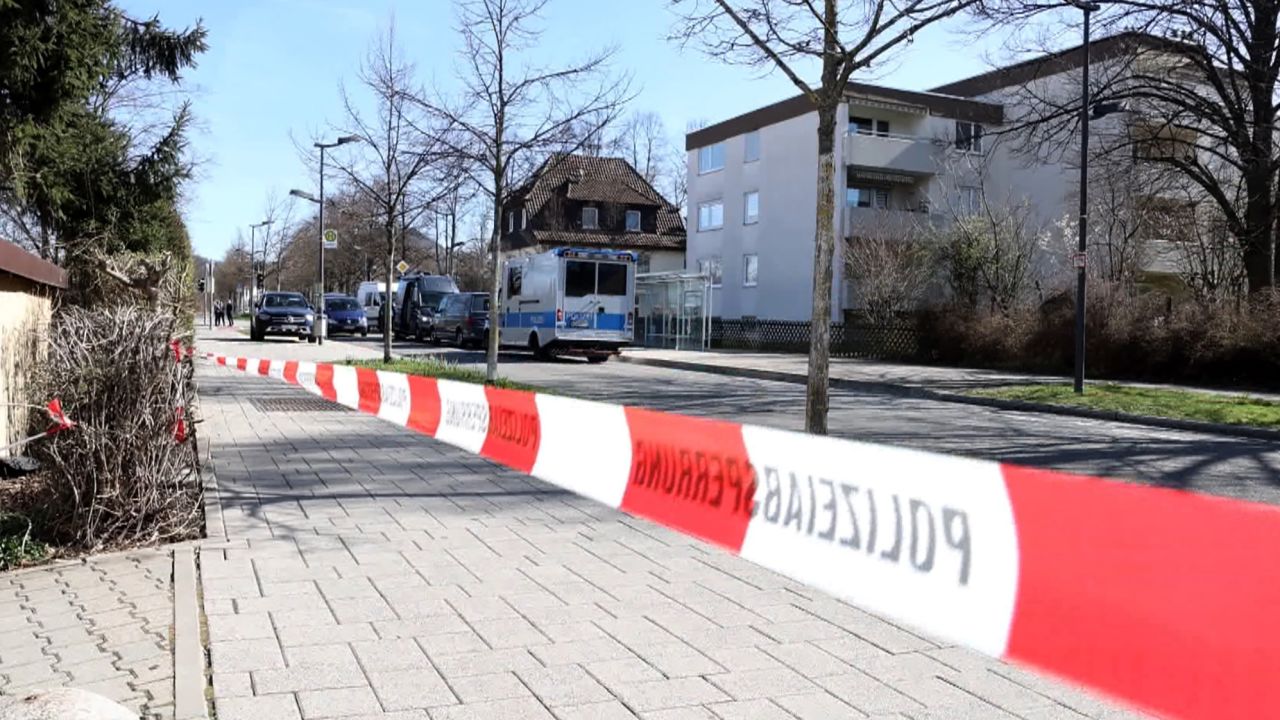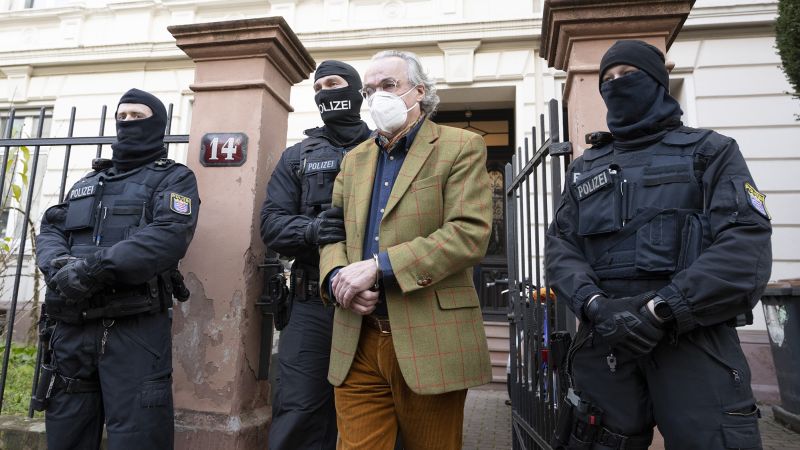Berlin
CNN
—
An extremist and until recently almost unheard-of network in Germany is back in the spotlight after police carried out nationwide raids against it.
The Reichsbürger movement – made up of small groups and individuals spread across the country – peddles a number of bizarre views and rejects the legitimacy of the state.
In December last year, 25 people were arrested on suspicion of plotting to attack Germany’s parliament building, overthrow its constitutional order and install the group’s central figure – aristocrat Heinrich XIII Prince Reuss – as leader.
Raids linked to the group continued this week, with German officials on Thursday saying they had placed one person who was a suspected member and supporter under formal arrest after a police offer was shot and wounded on Wednesday.
Germany’s Justice Minister Marco Buschmann said the shooting “shows how dangerous the missions are. It is the duty of the authorities to disarm Reichsbürger.”
As the crackdown continues, CNN takes a look at what exactly the movement is and the danger it poses.
The movement’s adherents have a range of beliefs, including that modern Germany is not a sovereign state and should therefore be rejected as a legitimate form of government.
Some believe that the German Empire of 1871 still exists while others want to bring back Hitler’s Third Reich.
Many subscribe to right-wing, populist, antisemitic and Nazi ideologies.
Werner Patzelt, a political scientist and former professor at TU Dresden, believes the Reichsbürger is less of a “movement” but rather “a loosely coupled network of political stupids who believe that, or at least behave as if, the Federal Republic of Germany does not exist.”
“They claim that Germany is still an occupied country under US control, or a business enterprise registered in Frankfurt,” he told CNN.
“From such fictitious ‘facts’ they derive both a ‘right’ not to pay taxes and penalties, or to establish ‘provisional political authorities.’
“Much of this is operetta-like. In some cases, however, criminal energy goes hand in hand with political nonsense, leading to attacks on financial or police officers.”
Followers refuse to cooperate with the German state in a number of ways including not paying taxes or choosing to print their own currency and identity cards.
Tobias Ginsburg is a German journalist who reported undercover on Germany’s far-right scene.
“You meet people there of all walks of life,” Ginsburg said. “I met the stereotypes, but also normal people, the dentist from downtown, someone working with the tax revenue service, just normal people. Some had no idea what they had entered.”
He thinks that authorities stepping in to prevent last year’s coup attempt is the “bare minimum” that can be done to tackle a wider issue of far-right extremism in Germany.

Ginsburg said that large parts of the German population had the perception of the Reichsbürger “that these are loonies, these are old people, or even a Prince –– he seems strange – and the question that everyone is asking could they have been successful, but this is not the question.”
The “royal” concerned is 71-year-old Heinrich XIII Prince Reuss, one of the group’s alleged ringleaders. The prince is a descendant of the House of Reuss, the former rulers of parts of eastern Germany, and now works as a real estate entrepreneur, according to CNN affiliate NTV.
“What we need to see as society and what our politicians need to understand is that the problem is not some so-called Reichsbürger, the problem is far-right ideology getting more and more people to act upon their beliefs,” Ginsburg adds.
According to government data, there are about 23,000 Reichsbürger members, up from 19,000 in 2019.
Of these, an estimated 1,250 people are associated with the right-wing extremist scene.
Ginsburg believes the official figures are “conservative,” saying many members choose not to make their affiliation public.

The group gained prominence during the Covid-19 pandemic, which saw a significant rise in conspiracy theories in Germany, especially relating to the Reichsbürger and QAnon groups, according to research published by the Global Network on Extremism and Terror.
The Reichsbürger movement’s ideologies, including the refusal to follow restrictions imposed by the German state, found common cause among Covid-19 deniers and anti-lockdown protesters.
Such ideologies were peddled by the Querdenker organization – the largest Covid-19 deniers’ movement in Germany.
Querdenker organized large demonstrations to protest against Covid-19 measures mandated by the state, with symbols of the Reichsbürger and QAnon groups often displayed at such rallies.
Germany’s Interior Ministry gave a damning assessment of the movement in a statement to CNN, describing adherents not as “harmless nutcases” but rather “dangerous extremists who are driven by violent fantasies and possess a lot of weapons.”
The group’s firearms stockpile has left authorities particularly concerned. Latest government figures show that around 400 members own weapons. Since 2016, 1,100 people have had their weapons permits revoked.
Some 2,300 adherents are considered to be prone to violence – an increase of 200 people compared to 2021.
According to the Institute for Strategic Dialogue, another cause for concern is that a significant number of the group’s members are thought to be current or former soldiers, including from elite units, who are highly trained and in some cases legally possess firearms.
Ginsburg calls the group “extremely dangerous” and is concerned that their ideology could spread.
“If you look at the right-wing AfD [Alternative for Germany] party – a big party after all – you find bits and pieces of that conspiracy theory in their official programs and you have people sitting in the parliament in far-right circles, in Reichsbürger circles,” he said.
To combat this threat, Ginsburg says the issue of the far right in Germany should be tackled in schools through better education on the subject.
“We talk so much about the fight against the far right and about the long shadow of history, and yet the education on what fascist beliefs are, how widespread are they, how can we stop them, they are vague at best,” he said.
The German government insists it will continue to take action – like the raids seen this week – until the country is rid of such extremism.
“We protect our democracy against extremist threats,” the Interior Ministry said. “We will continue this tough approach until we have completely exposed and dismantled these structures.
“No one in this extremist scene should feel safe.”

